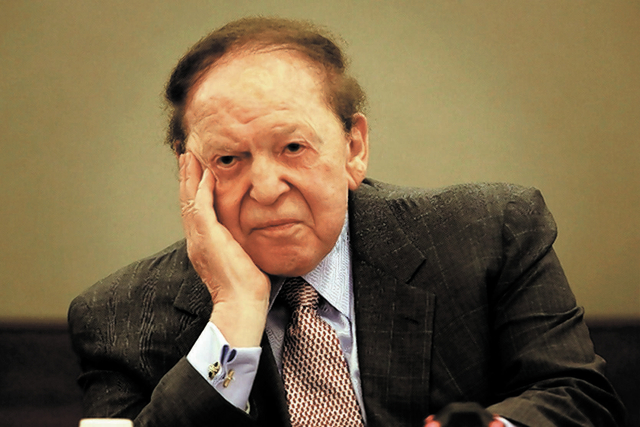Adelson faces steep odds in campaign to roll back Internet gambling

Earlier this summer, Sheldon Adelson told those nasty little Internet gaming punks to get off his lawn.
Now, he thinks they egged his house.
As payback, the chairman and CEO of Las Vegas Sands Corp. says he’ll put online gaming out of business forever in the United States.
Adelson, 80, who is ranked 11th on the Forbes 400 with a net worth of $28.5 billion, is opening his wallet to fight what he once dubbed “a toxin all good people should resist.”
He’s forming an advocacy group, the Coalition to Stop Internet Gambling. He’s hiring Washington, D.C., lobbyists and public relations experts. He’s enlisting the help of former elected officials. Adelson is armed with a public opinion survey — directed by a noted Republican pollster — that says 67 percent of Americans oppose legalizing Internet gambling.
A public campaign showing online wagering as a danger to children, poor people and those with gambling addiction is being readied.
By the way, did we tell you that Adelson is the founder and 53 percent owner of Las Vegas Sands, which has casinos in Las Vegas, Pennsylvania, Macau and Singapore that produced more than $11 billion in revenue last year?
Adelson plans to take his anti-Internet gambling message to Congress and state capitals to quash any legalization efforts. But stopping online casino expansion isn’t enough. Adelson wants Congress to outlaw all Internet gaming.
For all of the millions of dollars he says he’ll spend on his campaign, Adelson will have as much success forcing a federal ban as a hand of ace high has versus a full house. He just isn’t holding the cards.
Internet gaming is not going away, no matter how much money Adelson throws at his new holy war.
Nevada and Delaware launched real money online gaming this year. New Jersey begins accepting Internet wagers Tuesday. At least a half-dozen other states, including California, Illinois and Pennsylvania, are considering Internet gaming legalization.
Other than Las Vegas Sands, the casino industry — for the most part — wants Internet gaming legalized and regulated.
American Gaming Association President Geoff Freeman said U.S. gamblers spent $3 billion in 2012 wagering online with “rogue offshore operators.” The prohibition Adelson advocates just won’t work.
“The Internet cannot be forced back into the bottle,” Freeman said.
The association, which has Las Vegas Sands as a member, supports “pragmatism and strong regulation of online gaming that protects consumers, prevents underage play, ensures the integrity of the games and empowers law enforcement,” Freeman said.
New Jersey lawmakers haven’t been as diplomatic.
With the state investing millions of dollars in this week’s launch and the business viewed as way of propping up the sagging Atlantic City casino industry, Adelson’s campaign wasn’t well received.
“If Sheldon Adelson wants to spend a lot of money shouting into the wind, fine,” Democratic state Sen. Jim Whelan told the Press of Atlantic City. “It’s a little hypocritical.”
On Capitol Hill, two Internet gaming bills were introduced this year. A companion bill that would tax federally sanctioned online wagering was put forward last week. Senate Majority Leader Harry Reid, D-Nev., is reportedly ready with his own legislation that would legalize Internet gaming.
But Congress can’t compromise on a lunch sandwich order, let alone agree on complex legislation. Adelson’s newest campaign against Internet wagering will only sideline some Republican members of Congress if the legislation actually comes up for a vote. They won’t risk getting sideways with Adelson and his checkbook as the 2014 elections fast approach.
In 2012, Adelson and his wife spent nearly $100 million to help Republican candidates across the country, to keep Newt Gingrich’s presidential campaign alive and to back GOP nominee Mitt Romney. His lone success was the election of Sen. Dean Heller, R-Nev.
So Adelson is not opposed to throwing away money on politics, nor has he ever hidden his distaste for online gaming.
In a Forbes.com commentary in June Adelson called Internet gaming immoral, fool’s gold and a threat to society.
“Click your mouse and lose your house,” Adelson warned.
The commentary earned him scorn from other casino operators, the online gaming industry, and a brief boycott of The Venetian poker room by players.
This time, Adelson says he’s doing it for the children.
In reality, the online gaming business model doesn’t work for Adelson’s Las Vegas Sands, which derives 85 percent of its quarterly revenue from Macau and Singapore.
Spending millions on Internet gaming technology, acquiring the business expertise, and marketing an online product wouldn’t have the same return on investment as a new $2.5 billion resort in Macau.
Caesars Entertainment Corp., however, views Internet gaming legalization as the company’s own personal Macau. As owners of the World Series of Poker, the company owns the game’s best-known brand. Caesars plans to jump into Internet gaming opportunities as new states open their borders.
Caesars will fight Adelson’s anti-Internet gaming efforts every step of the way. So will MGM Resorts International, Boyd Gaming Corp. and even Station Casinos, which owns Ultimate Gaming.
“The Internet is the world we live in, and regulations protect the consumer,” Ultimate Gaming Chairman Tom Breitling said.
Adelson’s philosophy is simple. He has no reason to participate in online gaming. But if he’s not going to play, he wants to shut down the game for everyone else.
Howard Stutz’s Inside Gaming column appears Sundays. He can be reached at hstutz@reviewjournal.com or 702-477-3871. Follow @howardstutz on Twitter.












